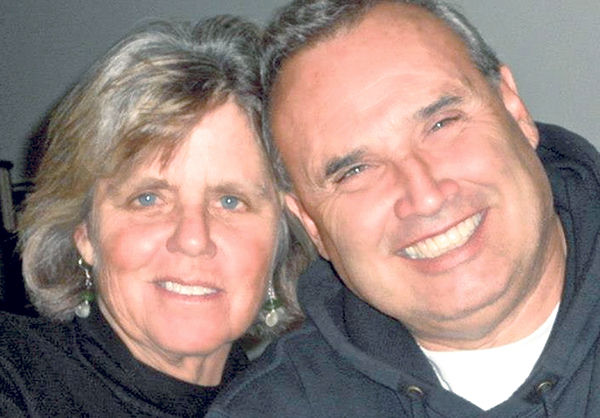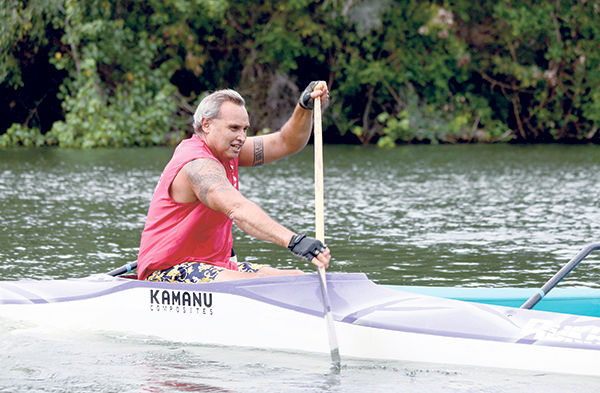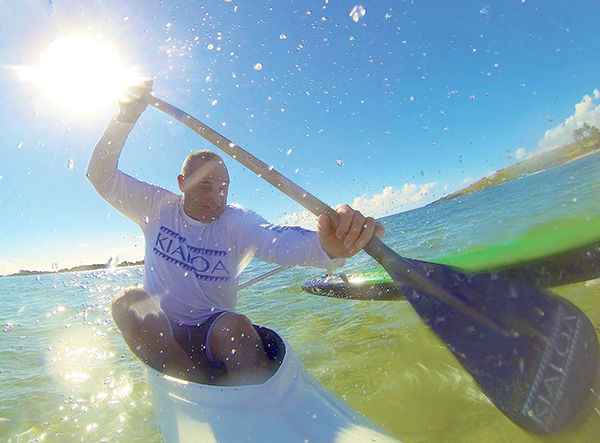Six months after Vic Allen lost his sight at the age of 38, he was at a recreation center for the blind, when someone mentioned they were taking some people skiing. “I said, ‘How do blind people ski?’ So I
Six months after Vic Allen lost his sight at the age of 38, he was at a recreation center for the blind, when someone mentioned they were taking some people skiing.
“I said, ‘How do blind people ski?’ So I went skiing with them for a weekend at Big Bear, California,” Vic says.
He had skied before he went blind, but it felt different now. “When they strapped the skis on me I went, ‘Whooooaaa!’
By his second day, Vic had taken to his new sport, skiing the black diamond runs that are designed for advanced skiers.
So it seemed only natural that he was invited to try blind ski racing.
“The next thing I knew, I was skiing on the United States blind ski team, representing the U.S. in Europe,” Vic says. “I was the No. 1 blind skier in the U.S. and No. 2 in the world for five years.”
This is how Vic Allen lives his life — positive, gregarious, exuberant.
He engages in animated conversation, moving his head and eyes the way sighted people do, turning to look at you when speaking, gesturing with his arms to indicate heights or sizes of things as he describes them. At 6-foot-2, tanned and muscular, he seems like a big, happy teddy bear — one with a penchant for competitive sports.
I see what I want to see
By the time Vic moved to Kauai in 2004, years of playing blind sports had taken a toll on his knees, including a seven-year stint on a blind baseball team that won the World Series four times.
It was a natural progression for him to join a canoe paddling team.
“Paddling was easy — a sit-down sport, no running, no jogging.” Besides, he says, “I’m more comfortable in the ocean because I can’t run into things out there.”
Paddling does more for Vic than provide another testosterone outlet. Whereas many blind people have to rely on others, Vic has become an integral member of his canoe team, even being tasked with righting the 400-pound canoe when it capsizes in the ocean.
“Paddling with six guys is all about lokahi, unity, because everyone in the wa’a (canoe) moves in unison. When everybody’s on, it’s just like being in a rocking chair,” he says. “It’s kind of like synchronized swimming in that respect. One guy is not going to make that wa’a go; it’s us doing it all together.”
Vic’s first race in Poipu on Kauai’s South Shore gave the audience more than they bargained for when his team’s canoe flipped over (hulied) just before the finish line.
“The crowd was on the beach going, ‘Oh, the blind guy hulied.’ I just locked in with my knees, like I always do. I grab the seat and go with the canoe so it doesn’t land on me. I never let go of the canoe. I become part of the wa’a.
“Kauai wasn’t used to seeing blind people paddle,” Vic says. “But now they know I’m just a regular guy who loves to paddle.”
For years ago, when his team’s canoe flipped over during the 42-mile Molokai-to-Oahu race that crosses the 2,000-foot deep ocean channel, with choppy seas and high waves, the stakes were much higher.
Vic made the most of it.
“They forgot that the blind guy was in the water. I was so comfortable out there, I was just off to Japan!
“I put my head in the water out there, like I always do. Of course I have to open my eyes underwater so I can see. I guess I can’t really see but I do see,” he says. “Sometimes I’ll say, ‘Look at the size of that fish.’ I see what I want to see. Don’t rain on my parade.”
I see perfectly fine
Vic first lost sight in his left eye when he was 28 years old, after being jumped by about five guys outside a tavern in Southern California. His eyes were punctured in the fracas. Ten years later, due to a combination of complications, he lost sight in his right eye, leaving him completely blind. He wears prostheses that look like natural eyes.
“I don’t see anything. I have no light perception at all. And yet, I see perfectly fine. I see it completely in my mind. As we talk I’m forming a vision of you,” he says.
When Vic first attended a center for the blind, he rebelled at the slow pace of Braille, a system of raised dots on paper used by many blind people to read. So he didn’t learn it. That cost him once he joined the blind baseball team.
“I was a dumb blind guy because I didn’t know Braille so my nickname on the team was ‘Rocks,’” he says. “We’d play poker with Braille cards and the guys would take all my money because I was so slow reading the cards. I would feel the card, trying to figure it out. I’d say out loud, ‘That’s the two of twos. No, that’s the two of aces. What is a two B?’ They’d say, ‘You’re telling us your cards,’ and they’d take all my money. So they nicknamed me ‘Rocks.’”
Other than losing at poker, “being blind isn’t all that bad,” Vic says. “It’s like when you go scuba diving and it’s a whole other world. You adapt to it and you become another fish in this world.
Vic makes few accommodations to being blind — you should see him dance with his wife, Annie McEveety-Allen. People with perfect vision rarely exhibit that much joy and enthusiasm.
And he has the ability to feel what many sighted people cannot: who someone truly is on the inside.
“So many times in life you can be judgmental, judging someone by how they look,” he says. “I get their energy they have inside. I think everyone has that ability, but you’re distracted by things that are really kind of meaningless.
“Nobody’s perfect. You can see it in the guy in a wheelchair and in the guy missing an arm. With me, most people don’t know I’m blind and most don’t believe me until I tap on my eyes or I flip one around for them,” he says, laughing. “There are still some people who paddle who don’t know I’m blind.”
Vic attributes his positive attitude to his mother, “all 5 feet tall of her,” and to his faith. He says, “I know where I’m going when I’m done and it’s all good.”
He says he has his bad days, when he’s aggravated that he can’t just jump in a car and drive away, or “when you go in the cupboard where the peanut butter is supposed to be and nobody’s there to help you and you spend half an hour looking for it and you find out it’s on the next shelf where it’s not supposed to be.
“It teaches me patience and acceptance,” he says. “Now I have a lot of patience.”
And he’s full of joy to be living on Kauai.
“This island has such good energy. You can feel the energy up in the mountains and when you’re in the water,” he says. “A lot of it has to do with the people.”
Vic Allen is one of those people.
•••
Pamela Varma Brown is the publisher of “Kauai Stories” and the forthcoming “Kauai Stories 2.”




